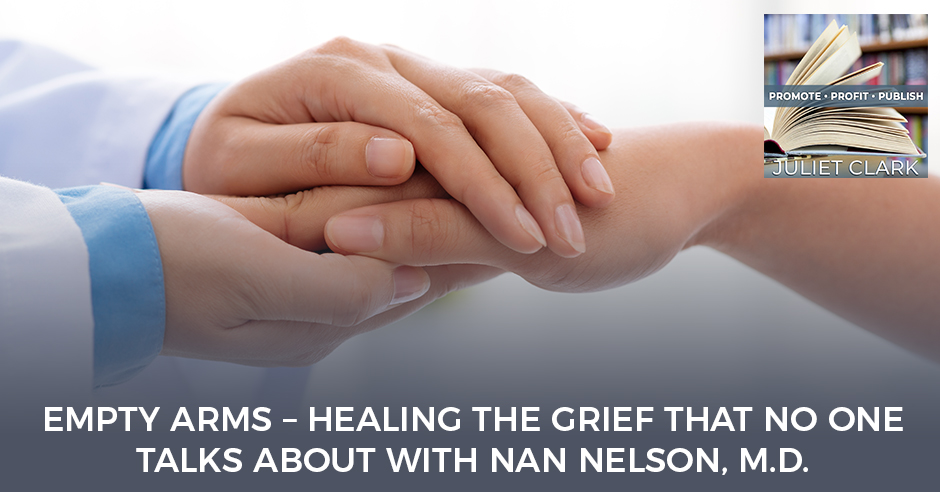
Talking about death and loss never gets easy. But Dr. Nan Nelson is here to lend a hand in healing your grief. Dr. Nan Nelson is a child and adolescent psychiatrist and has been featured on multiple media outlets as an advocate for women’s health, underscoring Perinatal psychiatry and mood disorders. She sits down with Juliet Clark to discuss the importance of knowing how to deal with patients, especially when it comes to handling loss and grief. She wrote the children’s book, Missing Butterfly Feelings, to help thousands of kids who lost their parents to COVID. Nan also talks about her next project, Empty Arms, for mothers and families grieving the loss of a child. Join in on their conversation to learn more.
—
Watch the episode here
Listen to the podcast here
Empty Arms – Healing The Grief That No One Talks About With Nan Nelson, M.D.
Our guest is going to talk about her book and what her next step was with the books. What our publishing company is so much about is getting ROI from those bigger programs and services that you put. Before we get started with Nan, I want to remind you to go over and take our Promote Profit Publish Quiz. You can find that at www.PromoteProfitPublishQuiz.com.
Find out if you’re ready to publish. There’s a lot to this. I hate to tell you but writing that book was the easiest part of all of this. Publishing is a long process. Not that it sucks but it can be very stressful. The marketing is horrible. You’ve got to figure out if you have all those pieces in place. It takes a long time to build it up. Don’t forget to go over to Super Brand Publishing and subscribe on YouTube. If you’re reading in someplace and if you want to see what these people look like or you’re a more visual person than reading, you can see all these interviews over on our YouTube channel.
I’m excited. I’ve been working with our guest for years. Her name is Dr. Nan Nelson. She’s been featured on ABC, NBC, CBS, Fox and the CW as a Personable Advocate for Women’s Health with an emphasis on Perinatal Psychiatry and Mood Disorders throughout the life cycle. She’s down-to-earth and compassionate. She’s no BS, which is why I’ve enjoyed working with her so much. She uses individualized medication management using pharmacogenomics. She’s an educator on how the brain and body works.
Dr. Nan attended medical school at the University of Texas Health Science at San Antonio. She did her Adult Psychiatry Training as well as child and Adolescent Psychiatry Fellowship at Case Western Reserve University Hospitals of Cleveland. She’s a double Board-Certified Psychiatrist in both. She did her Perinatal Women’s Trainings with Dr. Maryann Rosenthal at McDonald’s Women’s House. She completed her Early Childhood Education and MBA prior to medical school. She lives in Northeast Ohio with her 2 children, 3 cats, 1 dog and her daughter’s bearded dragon. Welcome, Nan. It’s great to have you.
Thank you. It’s good to be here.
Talk about your journey because most medical doctors go right in after their BSBA or most of them have bachelor of science degrees in some scientific area. You didn’t do that, which has given you unique insight into communication and education.
I went off to college, fell in love, got married and got divorced. I thought I was going to have 2.5 children and live happily ever after and it didn’t quite happen. I worked for a publishing company and the publishing company was being sold. I had been thinking, “What do I want to do?” Originally, I would’ve said, “I wanted to go to medical school.” Finally, I decided that if I kept wishing, I was going to go to medical school, maybe I should try going. I moved back into the dorm. I leased my house, took the pre-med courses and got into medical school.
There was the journey between you and an old roommate in there too, where you got this constant tap on the head about, “Are you going to do this?”
She would call up and say, “I delivered the baby.” I think, “Why am I not helping others this way?” She was the thing that kept getting me back on track saying, “I want to do this. Why don’t I do this? What if I don’t get in? What if I’m too old? What if I’m a woman? What if I’m not smart enough?” That’s when I finally decided that maybe I needed to try it.
I got into medical school and discovered already that I had life experiences that a lot of these kids who goes straight from high school to college, to medical school, have no idea what life is like. One of the stories I tell is that the attending physician wanted Scotch tape and medical students were all insulted. “That’s not my job.” I’m like, “What are you talking about?” If the head of the company wants Scotch tape, you say, “You want 0.5 inch, 1 inch? You want me to dance in the street with this? What would you like me to do?” It already gave me an understanding that these people have no life experiences.
You have to meet the patient where they’re at and do what they need, not what the doctor thinks they need to do. Share on XThere was a guy that was a diabetic. They weren’t making fun of him but they were badmouthing him because he wasn’t taking his insulin. After rounds, I went back and asked him what had happened. He was very poor and was deciding whether to buy insulin because he didn’t have insurance versus feeding his children.
That’s a whole different story than being non-compliant. You can contact the social worker and figure out how to get him insulin and insurance, rather than saying, “He doesn’t want to be well. He’s not compliant. He doesn’t listen.” I began to see that there was a different side to medicine. I already had a job and an insurance. I had to work with other people. I could see the angst of the people that I was treating and working with.
That’s what led me down a different path. Case Western Reserve calls them bent arrows and I’m clearly a bent arrow. I see things differently and I say so. I have no real problem speaking up to other physicians when they’re not using logic, “What are you doing? Why? Run this by me again?” That would be straightforward and easy.
There was a woman who was mentally retarded and broken her ankle. She thought the surgeon talked too fast. She got wheeled into the operating room that her dad had died in. She thought if she was going to have anesthesia that she would die too. The guy talked too fast and she couldn’t say to him. “How can you tell me I’m not going to die like my dad did?” I came up to the guy. I’m like, “She says you talked too fast.” He says, “No, I don’t.”
I’m going down the hall. I said, “We need to stop and get graham crackers and ginger ale.” He said, “Why are we doing crackers and ginger ale?” I said, “It’s because that’s the language that the patient you’re going to talk to needs. She needs somebody to have a snack, be a real human and talk to her so that she doesn’t get scared.” Eventually, it went all right but the point is that you have to meet the patient where they’re at and do what they need. Not what the doc thinks they need to do. There’s a place for medicine but you have to meet the person and deal with what they need.
One of the ones you’ve introduced me about was pharmacogenomics. You can get genetic testing. There’s a couple of different ones where you either swab the inside of your mouth, spit in a cup or do blood. What you figure out is how the enzymes in your liver work and then how the medicines work with that.
You’re no longer saying what 1,000 people can do. You’re talking about what your body can handle and what you need. I’ve done probably 500 of them. I like to use it as a tool to figure out where to go. You can have some significant differences in outcomes, lower doses, less side effects and better results. I like it. It’s where medicine is going. It’s called personalized medicine. If you ever watch Cancer Center of America, that’s what they do. They send off their genetics and then choose the cancer medicines based on what their body will tolerate. It’s quite impressive.
You’ve also been a prolific book writer, which is what brought you to me. Talk about each of the books you’ve written. I do love the whole story behind The Moose Who Loved TV.
One of the books I wrote was The Moose Who Loved TV. I grew up in Alaska. We lived in a split-level house that had three large windows. In our day and age, it’s nothing but in Alaska where the glass has to be flown in, this moose would stand there and he would watch TV. As long as the Western was on, he watched and enjoyed them.
When the commercials would come on, he would stand there and shake his antler. These are 6 plus feet apart. He and I are like nose to nose because my couch was facing the windows where he would look in. He would shake the antlers and my mother would go bananas. She would say, “We don’t have enough wood to cover the glass if he breaks the glass.” How do we make them go away?
He wasn’t going to go away. He liked it. He liked eating the food out of our garden because in his mind, it was all lined up and ready to eat, especially when it was snowing outside. How convenient of these people to do that? We had a couple of acres of garden. Eventually, he brought his son. It as a son because he was budding antlers as well. It’s the story of Marty looking in through the window, watching Westerns and then standing there shaking his antlers. It’s a kid story.
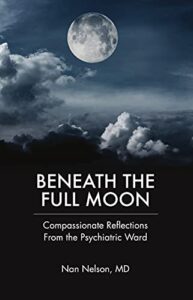
Beneath the Full Moon: Compassionate Reflections from the Psychiatric Ward
One of the other books is about perinatal. Let’s circle back to that. There are two books you released this 2021, Beneath the Full Moon. Tell us why you wrote that. What was that all about?
My perception of what happens during the full moon, all hell breaks loose everywhere during the full moon. There are studies that show that there are more EMS, police and emergency room visits. It’s still equivocal as to whether more babies are born during the full moon. I began to collect these stories in my head mentally. During COVID is when I began to put the stories together. There’s some stuff that happened in psychiatry that you can’t make up.
At one point, I had God and Jesus on the unit at the same time. One thought he was God and one thought he was Jesus. God dabbed Jesus, gave him a cut on his forehead and had to have stitches. The ramifications ran through the unit with these two pontificating at each other. I used that as a way to talk about mental illness.
If you have someone who’s psychotic in your family, bipolar, depressed or suicidal, somebody who’s using drugs and alcohol and the list is not short of things. I take on some of the stories, describe what that piece of mental illness is like and then what you can do with the help of other family members. I put that one out in June 2020. That’s when you and I met. I was working on that book.
With COVID, I reprinted through you a book called Missing Butterfly Feelings because there are 120,000 children who have lost parents during COVID. The book is a children’s book. It talks about how to teach children talk about death and dying. If adults can’t talk about it, you can’t expect children to talk about it. That’s why I re-put out that book because of COVID.
One of the other books was Treatment of Perinatal Mood Disorders. It’s talking about what you do before, during and after pregnancy. We’ve known since Hippocrates that women do interesting things before they get pregnant, when they get pregnant, when they deliver and when they go through menopause, except that we can treat it. We don’t have to let it go by and say, “That woman,” take her children away or have them end up in jail because they kill their children. There are things we can do to intervene before that. I don’t know why but that’s my real love.
One of the programs I’m working on is Empty Arms. It’s talking about grief and loss through miscarriage and infant death because nobody talks about that. There is nothing out there for them. It’s pretty miserable. They’re sad and they get all these platitudes, “You can have another one. Now you know you can get pregnant. You want to do this again.” All the things that go with it that doesn’t get dealt with and it’s quite painful. I’m putting together a course where women could begin to deal with this.
I found a woman in Australia who’s a nurse-midwife who wants me to run my programs by her and see if she thinks she can add anything. I’m more than open to ideas. I’m trying to put together some things that they can do rather than sit, cry and processed the grief. One of the things that have come out of COVID is grief and loss. We’re going to have a generation of PTSD from COVID, personally is my opinion.
I was reading news reports talking about there’s a whole generation that has anxiety and depression over climate change. You are so compassionate but for someone like me, I look at it and I’m like, “What happened to that thing about letting go of the things we can’t control?”
There are things we can do to control our climate. There are some things that we can get together to do. We have these world conferences. Humans have made this mess. We can undo part of this mess. We can’t undo everything but we can make a difference. Our children are going to inherit this world. The way it’s said is not very good. There is a generation of people who are quite worried about it and with good reason.
(Missing Butterfly Feelings) talks about how to teach children to talk about death and dying because if adults can’t talk about it, you can’t expect children to talk about it. Share on XYou and I have been working on this program. This is what I love about what you’re doing is you work in any space of mental health but when we chose this, you were passionate about it. You wrote a book before but then what we’re getting into with Empty Arms is a workbook to help through the depression. A lot of times, people not only don’t address it but it’s not just the mother that’s going through it. It’s the father that’s going through it. There’s a whole family dynamic with it.
We’ve had a launch party for Missing Butterfly Feelings. When we do launch parties, we talk about the next steps that we’re going through. You would not believe the number of people on that call that had great ideas for Nan. Do you want to talk about that a little bit? You’ve collaborated with some of these people that given you great ideas.
One of the women who spoke up has a cousin who’s had multiple losses. She’s like, “I don’t know what to tell her.” I’m like, “Let’s talk about that. Would she be willing to work with me? Let me try the ideas for grief and loss on her first.” She was like, “Yes.” There was a psychologist who was the only male and somebody asked him, “What effects are this on men?”
He spoke up and said, “It’s huge.” What he didn’t tell people that I happen to know personally is that they ended up adopting and so they had some losses before that. He was speaking personally that this is huge on a family, on a marriage and on a couple. Where do they go from there? How do they decide what to do? There was some real insight.
I probably would have skated over the masculine side of this stuff but it makes sense because then I worked with another woman who had a loss and her husband said, “We’re not going to try again.” He got scared he was going to lose her. He was thinking, “What am I going to do if you have a baby and I’m left with no one to help me care for this baby? I can’t stand the thought of losing you.” It goes much deeper than what we think it can do to a couple, both male and female. There are some things that we can do to make it better.
This has been illuminating. As you can see, it’s not just about writing the books. It’s how are you going to translate them into something bigger than you can use to help people because most of you do write books to help people. Nan, do you want me to tell them where to find you?
One of the things that you helped me do is that I did videos for two of the books. I put them on LinkedIn and that’s why I ended up getting my podcast. I’ve done probably at least eight podcasts where people have asked me to be on their podcast to promote the book and talk about mental health. Juliet helped me get onto LinkedIn to link where I would meet up with these people and give them the video. The first time I said, “What am I doing?” She says, “You’re making nice, Nan. You’re talking to them.”
That’s why I get all these people asking me to do podcasts. There was one that they did a National Mental Health Day in India. They asked me to do about self-care. Another woman was doing a children’s program and she didn’t have anybody to talk about the birds, bees and/or bullying. I said, “I can do that.” I ended up going three podcasts out of that one.
Juliet is good in helping you figure out how not just to market your book. Once the book is out, it’s like, “I did it, now what?” It doesn’t fly off the shelves without some other things happening. You have to build a clientele of people who want to follow you and that you can help. Doing the podcast and working on this class, you can begin to start a following of people that you can help.
It isn’t just about the book. It’s about what comes next. That’s what Juliet is good at helping me do. It’s not that I’m not willing. I was floundering for a long time, “What do I do now?” We were able to begin to isolate. What could I do that other people couldn’t do that we could help other people with? She helped me make a website because I’m not as computer literate as some of us. I spent too much time doing medicine and all the things for people.
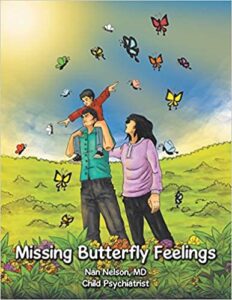
Missing Butterfly Feelings
She’s helped me put out a place where people can do a questionnaire to see if they’re ready to make changes. She’s telling me then put where these books would go to the website and then they can come to me if they want to do the testing to have the pharmacogenomics and how to find me. Then to be able to have people like you who want to get somewhere with yourself and make a difference in this world.
My website is HealGrowThriveWellness.com. In there you can find me, what the books are and also how to contact me. I admit as a psychiatrist, I didn’t want to put my name and address out there in full broad space. Many people need help and there are some that you want to do that in an office rather than giving away my home number where my children live. There’s a way to find me, have me reach out to you, you reach out to me and see if we can get things better for you.
Thank you for the testimonial. I wasn’t expecting that. This has been great being able to get ahold of her. If you’re reading and you know somebody who has perinatal that could use this help, Nan’s always glad to hear from people and talk to them. She is an amazing listener. You wouldn’t believe all the stuff she’s listened to on our calls. It’s like, “Why am I telling you this?”
People always have. I remember long before I ever went to medical school. I was standing in the grocery store and a woman explained to me why she was buying more toilet paper. I’m looking around and thinking, “Why is she telling me why she’s buying more toilet paper? I don’t want to know.” That was before there was a shortage. I said, “I’m glad you’re able to take care of that.” When people tell me things, I go, “Don’t you have a priest, rabbi or somebody who you can confess to besides me?” People tell me interesting things, which is why the book, Beneath the Full moon, is compassionate stories of the psychiatric.
You can find all these books on Amazon. Thank you for being with us, Nan. I appreciate you taking the time.
Thank you.
Important Links
- www.PromoteProfitPublishQuiz.com
- YouTube – Superbrand Publishing
- Dr. Nan Nelson
- The Moose Who Loved TV
- Beneath the Full Moon
- Missing Butterfly Feelings
- Treatment of Perinatal Mood Disorders
- LinkedIn – Nan E. Nelson, Psychiatrist, Author
About Nan Nelson, M.D.
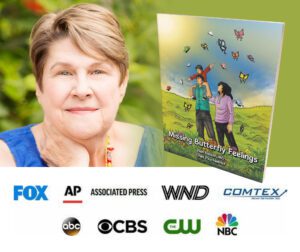
Dr. Nelson has been featured on ABC, NBC, CBS, Fox, and the CW as a personable advocate for women’s health with emphasis on Perinatal psychiatry and mood disorders through out the life cycle. Down to earth, compassionate, no BS, using individualized medication management using pharmocogenomics. She is an educator on how the brain and body work.
Dr. Nan Nelson attended medical school at the University of Texas Health Science at San Antonio. She did her adult psychiatry training, as well as her child and adolescent psychiatry fellowship at Case Western Reserve/University Hospitals of Cleveland. She is double board certified in both. She did her perinatal/ women’s training with Dr. Miriam Rosenthal at McDonald Women’s House. She completed an early childhood education and MBA prior to medical school. She lives in northeast Ohio with her 2 children, 3 cats, dog, and her daughters bearded dragon.

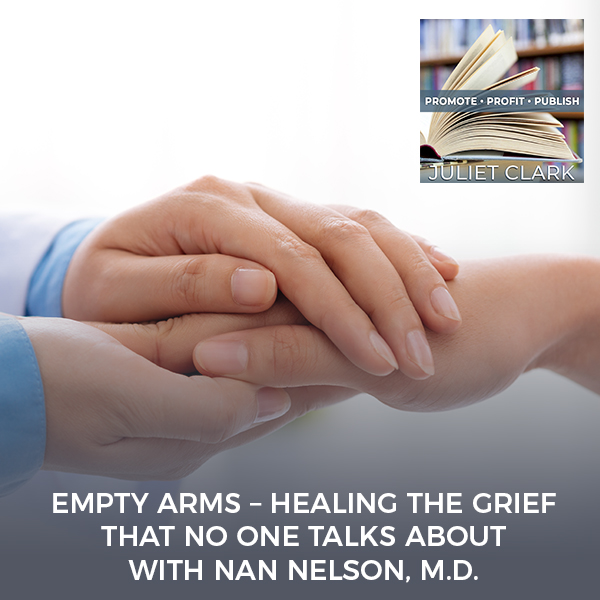







Leave A Comment